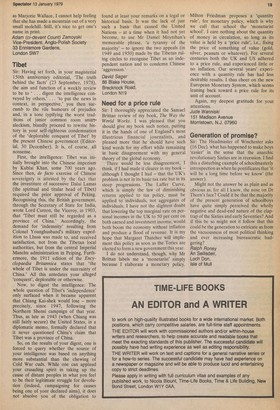Need for a price rule
Sir: I thoroughly appreciated the Samuel Brittan review of my book, The Way the World Works. I was pleased that you should give my book such notice, putting it in the hands of one of England's most illustrious financial journalists, and pleased more that he should have such kind words for my effort while remaining in basic disagreement with my general theory of the global economy. There would be less disagreement, I think, if I had made it clearer in my book — although I thought I had — that the UK's problem is not in its basic tax rate but in its steep progressions. The Laffer Curve, which is simply the law of diminishing returns applied to tax policy, must be applied to individuals, not aggregates of individuals. I have not the slightest doubt that lowering the top marginal rate on personal incomes in the UK to 50 per cent on both earned and investment income, would both boom the economy without inflation and produce a flood of revenue. It is my hope that Margaret Thatcher will implement this policy as soon as the Tories are elected to form a new government this year.
I do not understand, though, why Mr Brittan labels me a 'monetarist' simply because I elaborate a monetary policy. Milton Friedman proposes a 'quantity rule', for monetary policy, which is why we call that school the 'monetarist school'. I care nothing about the quantity of money in circulation, so long as its value is held by a 'price rule', i.e., fixing the price of something of value (gold, silver, peanuts or whatever). For several centuries both the UK and US adhered to a price rule, anti experienced little or no inflation. Our several years' experience with a quantity rule has had less desirable results. I thus cheer on the new European Monetary System, which seems leaning back toward a price rule for its unit of account.
Again, my deepest gratitude for your attentions.
Jude Wanniski 151 Madison Avenue Morristown, N.J. 07960


































 Previous page
Previous page